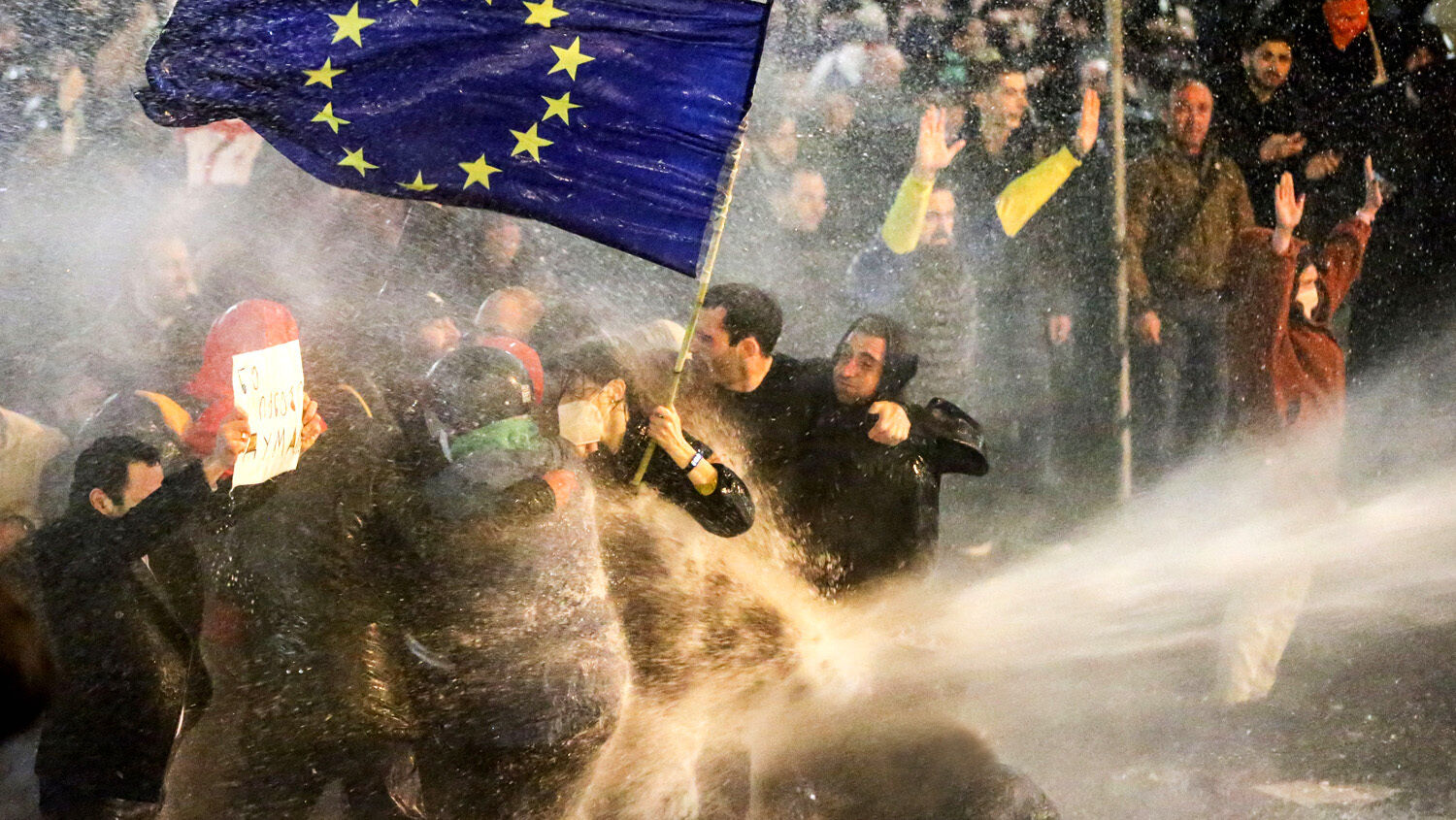
Massive Anti-Russia Protests Erupt in Georgia
Tens of thousands of demonstrators in the republic of Georgia began protesting violently on March 7 against a “foreign influence” bill that critics say Russia is pushing in order to tighten its grip on the ex-Soviet nation.
The legislation is modeled after a law Russia enacted in 2012 to crack down on dissent, which made Russia considerably more dictatorial. It would require any organization that receives 20 percent or more of its funding from abroad to register with the government as “foreign agents” and put them in the cross hairs of pro-Russia politicians. Such a law would also undermine Georgia’s attempts to align with the West.
- For nearly two centuries Georgia was part of the Russian Empire and the Soviet Union.
- In 1991, after the dissolution of the Soviet Union, Georgia achieved independence.
- Russia has since tried to restore control over the Caucasus nation, evidenced most dramatically by the 2008 war when a fifth of Georgia’s land was violently wrested from Tbilisi and transformed into de facto Russian territory.
Georgian leaders have long played a balancing act between the nation’s citizens, most of whom wish to join the European Union, and the geopolitical ambitions of Russia. In March 2022, fueled by fear that Georgia could become Russia’s next military target after Ukraine, Georgia applied for EU membership.
Russian dreams: Yet the country’s ruling Georgian Dream party is apparently undermining the application process and pulling the nation deeper into Russia’s orbit.
[E]specially over the past 18 months, Georgia’s ruling coalition has made a series of moves that seem designed to distance the country from the West and shift it gradually into Russia’s sphere of influence.
—The European Council on Foreign Relations (efcr)
The force behind this shift is Georgia’s richest man who made his fortune in Russia, remains aligned with the Kremlin and who founded the party. An efcr report states: “Much of the responsibility for this drift away from the EU lies with oligarch and former Prime Minister Bidzina Ivanishvili, whose Georgian Dream Party dominates the governing coalition.”
The foreign agent bill was the creation of Ivanishvili affiliates, and his party wholly and publicly supported the legislation. On March 7, Georgian Dream members almost unanimously voted in favor in its first reading in Parliament, which sparked the mass protests.
Georgia’s EU-aspiring citizens recognize that such a law would be a major step toward turning their nation into a dictatorship that is easily commandeered by Russia.
We are here to protect our country because we don’t want to be part of Russia again. … I came here because I know that my country belongs to Europe, but my government doesn’t understand it.
—Demetre Shanshiashvili, protester
The law would also undermine Georgia’s hopes for joining Western organizations.
Georgia’s international and bilateral partners have been very clear that adopting a “foreign agent” bill would be inconsistent with Georgia’s stated commitments to human rights and its Euro-Atlantic aspirations.
—Giorgi Gogia, associate director of the Europe and Central Asia Division at Human Rights Watch
Even after Georgian lawmakers formally dropped the bill on March 10, many citizens continued protesting. They demand that their government take more steps to pull away from the Russian sphere.
A forecast vindicated: When President Vladimir Putin’s Russia first invaded Georgia, Trumpet editor in chief Gerald Flurry said the illegal move marked the start of “a dangerous new era” for the world. In the 15 years since, this forecast has proved right in one nation after another.
- 2013—Putin ousted America from Kyrgyzstan.
- 2014—Russia seized Ukraine’s Crimea and plunged the nation’s east into a state of conflict.
- 2015—Putin began positioning Russia as a lead player in the Middle East, a perch from which he helped the murderous Syrian regime hold power and facilitated Iran’s pursuit of nuclear weapons.
- August 2020—Putin ensured that Belarus’s longtime dictator remained in power despite a major uprising, effectively turning Belarus into a human-rights trampling Russian satellite state.
- November 2020—Moscow stationed thousands of Russian soldiers in Azerbaijan for the first time, where they will remain, apparently, indefinitely.
- 2022—Russia expanded its war on Ukraine into Europe’s most devastating war in 25 years.
Meanwhile, Putin has repeatedly consorted with China to undermine the international order, helped North Korea become a more formidable nuclear power, propped up Venezuelan dictator Nicolás Maduro as Venezuela bleeds, worked with Germany to increase both nations’ power over their neighbors, and the list goes on.
Time has proved that Mr. Flurry was right when he said Putin’s 2008 strike on Georgia was only the start. His forecast that Putin would push the world into “a dangerous new era” was accurate because it was founded on Bible prophecy.
Learn more: To understand the prophecies this forecast was built on, order your free copy of Mr. Flurry’s booklet The Prophesied ‘Prince of Russia.’
